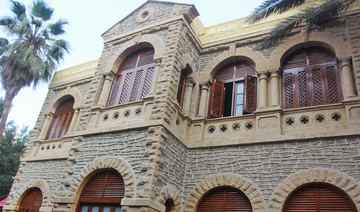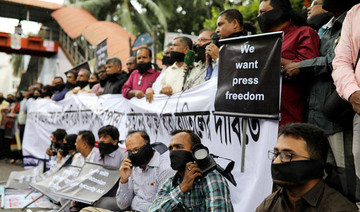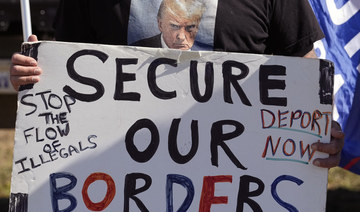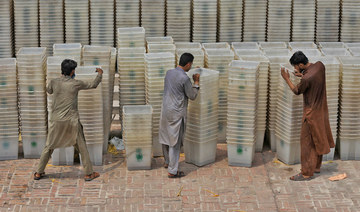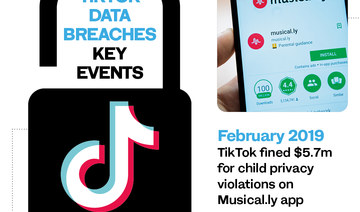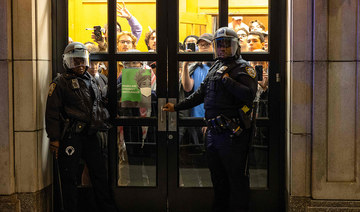ISLAMABAD: Pakistani journalists, who have taken on military dictators and been beaten and jailed in the pursuit of a free press, say they now face a form of censorship that is more subtle but no less chilling, one spearheaded by the security services.
Journalists and press freedom advocates say the military and the powerful Inter-Services Intelligence agency, or ISI, are pressuring media outlets to quash critical coverage. The newly elected government is meanwhile slashing its advertising budget, squeezing a key source of revenue for private newspapers and TV stations.
Qazi Salauddin, a veteran Pakistani journalist who has witnessed successive periods of direct military rule, said today’s censorship is the worst it’s ever been.
“Today we don’t know what will annoy them,” he said of the military. “Today we have to do self-censorship and that is the worst kind of censorship, because it is done out of fear.”
websites have been shut down, including the Urdu website of the US State Department’s Voice of America, after it reported on a tribal movement critical of military operations in regions bordering Afghanistan. Mashaal Radio, affiliated with Radio Free Europe/Radio Liberty, has also been shut down.
Journalist Cyril Almeida was charged with treason after he published an interview with Nawaz Sharif in which the former prime minister accused the Pakistani military of aiding the militants who carried out the 2008 Mumbai attacks.
Authorities are also targeting social media, asking Twitter to suspend accounts and submitting thousands of requests to Facebook to take down pages for a variety of reasons, ranging from criticism of the military to propagating hate and insulting Islam.
Taha Siddiqui, a blogger and journalist who is critical of the security services, lives in self-imposed exile in France after an attempt on his life earlier this year, which he blamed on the ISI. He said Twitter suspended his account twice in 72 hours, telling him it was because of “objectionable content that was in violation of Pakistani law,” without elaborating.
Journalist Matiullah Jan, labeled “anti-state” by the military for his criticism of the judiciary and army, called the crackdown “a systematic attempt by the military and its intelligence agency to assert control with a facade of a democratically elected government.”
New legislation regulating print and online media has also alarmed press freedom advocates, who fear it will grant authorities even more censorship tools.
Information Minister Fawad Chaudhry denies the government is cracking down on press freedoms, saying it only acts to prevent incitement to violence. Pakistan has banned coverage of the hard-line Tehreek-e-Labbaik movement after it held violent protests and threatened to kill a Christian woman who was acquitted of blasphemy charges after years spent on death row. Blasphemy is punishable by death in Pakistan, and the mere accusation can spark deadly mob violence.
“Pakistan has the freest media possible, and powerful media criticize the government and even agencies and (the) army establishment at their will,” Chaudhry told The Associated Press. “Incitement of hatred is the only area that we interfere.”
But journalists say the interference goes much further, and has worsened since July’s national elections. They say intelligence agents have called reporters to demand that opinion pieces be withdrawn and to quash investigative reports on allegations that the military intervened in the vote to help elect Prime Minister Imran Khan.
The security establishment is especially sensitive about coverage of the Pashtun Tahafaz (Protection) Movement, or PTM, which has criticized the military’s actions in the tribal regions. Pakistan has long been accused of covertly supporting the Afghan Taliban while waging a scorched-earth campaign against homegrown extremists who threaten the state, allegations denied by the government.
“We have been facing a media blackout since the very first day,” said Mohsin Dawar, a parliamentarian and founding member of the PTM. “The military now is enjoying unquestioned power in the country, and the PTM questioned their power.”
Dawar said newspapers have refused to carry their statements or cover their press conferences.
Chaudhry said coverage of PTM is restricted because “we have fought a war in that area.”
“The population is in process of settling down, (and a) narrative that creates hatred cannot be allowed,” he said.
Steven Butler, Asia program coordinator for the Committee to Protect Journalists, said Pakistan has waged an “aggressive crackdown” on the media.
“The crackdown comes behind the scenes and is increasingly exerted through the owners of media properties,” he said.
There are currently 89 private television channels licensed by the government. Most of the privately-owned channels emerged in just the last 15 years and are owned by big businesses, said Mohammad Ziauddin of the Pakistan Press Foundation, a free press advocacy group.
“The new entrants in the media are business people. They got into the media industry not to make money, not to serve the public, but to have clout,” he said, making them vulnerable to intimidation and financial coercion.
In the last two months, hundreds of journalists have been laid off as government advertising — a key source of revenue — has been drastically reduced. A rate schedule seen by the AP shows the government was until recently paying upward of $2,500 for a 60-second spot, which has now been reduced to $400 to $500.
“While reliance on government revenues is not a healthy model for press freedom, the sudden cutbacks have imposed extreme hardship on the media, which has had basically no time to adjust business models,” Butler said.
Chaudhry defends the new rate schedule, saying previous governments paid well above the market rate in return for positive coverage.
“The last government used television advertising as tool to bribe media,” he said.
Pakistan’s journalists complain of increasing censorship
Pakistan’s journalists complain of increasing censorship
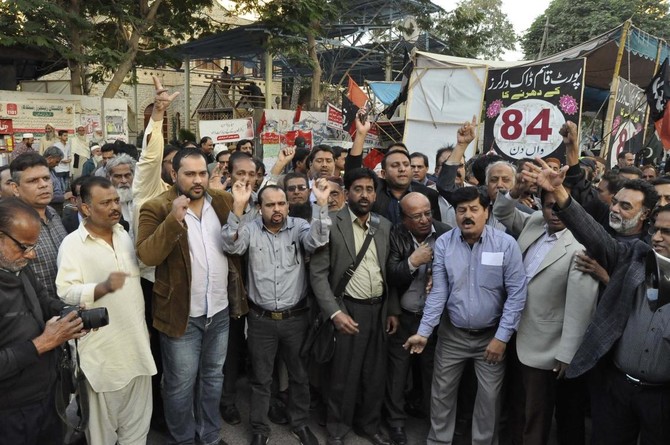
- New legislation regulating print and online media has alarmed press freedom advocates
- Information Minister Fawad Chaudhry denies the government is cracking down on press freedoms
Russian state media is posting more on TikTok ahead of the US presidential election, study says
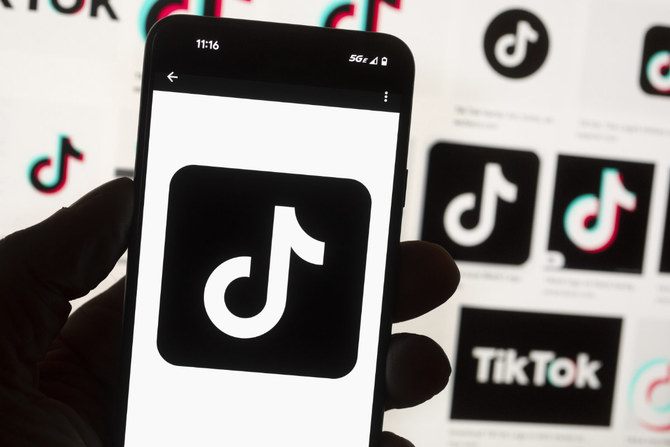
- State-linked accounts are also active on other social media platforms and have a larger presence on Telegram and X than on TikTok, says Brookings Institution report
- The report comes after Biden last month signed legislation forcing TikTok’s parent company — China-based ByteDance — to sell the platform or face a ban in the US
Russian state-affiliated accounts have boosted their use of TikTok and are getting more engagement on the short-form video platform ahead of the US presidential election, according to a study published Thursday by the nonprofit Brookings Institution.
The report states that Russia is increasingly leveraging TikTok to disseminate Kremlin messages in both English and Spanish, with state-linked accounts posting far more frequently on the platform than they did two years ago.
Such accounts are also active on other social media platforms and have a larger presence on Telegram and X than on TikTok. However, the report says user engagement — such as likes, views and shares — on their posts has been much higher on TikTok than on either Telegram or X.
“The use of TikTok highlights a growing, but still not fully realized, avenue for Russia’s state-backed information apparatus to reach new, young audiences,” reads the report, which drew data from 70 different state-affiliated accounts and was authored by Valerie Wirtschafter, a Brookings fellow in foreign policy and its artificial intelligence initiative.
The study notes that most posts do not focus on US politics but other issues, like the war in Ukraine and NATO. However, those that do tend to feature more divisive topics like US policy on Israel and Russia, and questions around President Joe Biden’s age, the Brookings report says.
A TikTok spokesperson said the company has removed covert influence operations in the past and eliminated accounts, including 13 networks operating from Russia.
The spokesperson said TikTok also labels state-controlled media accounts and will expand that policy in the coming weeks “to further address accounts that attempt to reach communities outside their home country on current global events and affairs.”
The Brookings report comes after Biden last month signed legislation forcing TikTok’s parent company — China-based ByteDance — to sell the platform or face a ban in the US. The potential ban is expected to face legal challenges.
US media experts demand review of New York Times story on sexual violence by Hamas on Oct. 7
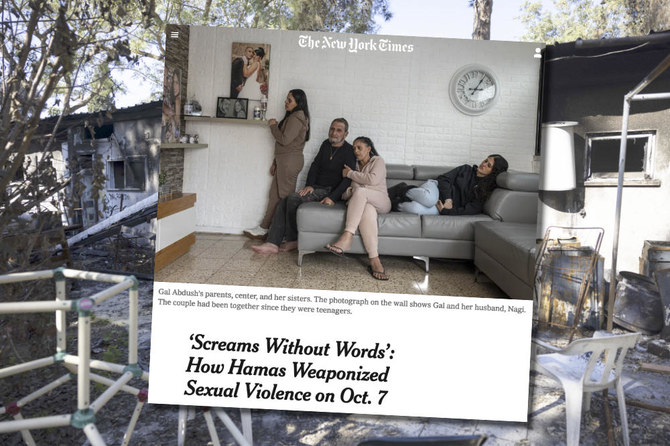
- 64 American journalism professionals sign letter accusing the newspaper of failing to do enough to investigate and confirm the evidence supporting the allegations in its story
- It concerns a story headlined ‘Screams Without Words: Sexual Violence on Oct. 7’ that ran on the front page of the newspaper on Dec. 28
CHICAGO: Sixty-four American journalism professionals signed a letter sent to New York Times bosses expressing concern about a story published by the newspaper that accused Palestinians of sexual violence against Israeli civilians during the Oct. 7 attacks.
It concerns a story headlined “Screams Without Words: Sexual Violence on Oct. 7” that ran on the front page of the newspaper on Dec. 28 last year.
In the letter, addressed to Arthur G. Sulzberger, chairperson of The New York Times Co., and copied to executive editors Joseph Kahn and Philip Pan, the journalism professionals, who included Christians, Muslims and Jews, demanded an “external review” of the story.
It is one of several news reports by various media organizations that have been used by the Israeli government to counter criticisms of the brutal nature of its near-seven-month military response to the Hamas attacks, during which more than 34,000 Palestinians have been killed and most of the homes, businesses, schools, mosques, churches and hospitals in Gaza have been destroyed, displacing more than a million people, many of whom now face famine.
The letter, a copy of which was obtained by Arab News, states that “The Times’ editorial leadership … remains silent on important and troubling questions raised about its reporting and editorial processes.”
It continues: “We believe this inaction is not only harming The Times itself, it also actively endangers journalists, including American reporters working in conflict zones, as well as Palestinian journalists (of which, the Committee to Protect Journalists reports, around 100 have been killed in this conflict so far).”
Shahan Mufti, a journalism professor at the University of Richmond, a former war correspondent and one of the organizers of the letter, told Arab News that The New York Times failed to do enough to investigate and confirm the evidence supporting the allegations in its story.
“The problem is the New York Times is no longer responding to criticism and is no longer admitting when it is making mistakes,” he said. The newspaper is one of most influential publications in the US, he noted, and its stories are republished by smaller newspapers across the country.
This week, the Israeli government released a documentary, produced by pro-Israel activist Sheryl Sandberg, called “Screams Before Silence,” which it said “reveals the horrendous sexual violence inflicted by Hamas on Oct. 7.” It includes interviews with “survivors from the Nova Festival and Israeli communities, sharing their harrowing stories” and “never-before-heard eyewitness accounts from released hostages, survivors and first responders.”
In promotional materials distributed by Israeli consulates in the US, the producers of the documentary said: “During the attacks at the Nova Music Festival and other Israeli towns, women and girls suffered rape, assault and mutilation. Released hostages have revealed that Israeli captives in Gaza have also been sexually assaulted.”
Critics have accused mainstream media organizations of repeating unverified allegations made by the Israeli government and pro-Israel activists about sexual violence on Oct. 7, with some alleging it is a deliberate attempt to fuel anti-Palestinian sentiment in the US and help justify Israel’s military response.
Some suggest such stories have empowered police and security officials in several parts of the US to crack down on pro-Palestinian demonstrations, denouncing the protesters as “antisemitic” even though some of them are Jewish.
New York Mayor Eric Adams, for example, asserted, without offering evidence, that recent protests by students on college campuses against the war in Gaza had been “orchestrated” by “outside agitators.”
Israeli Prime Minister Benjamin Netanyahu has said the protests against his country’s military campaign in Gaza are antisemitic in nature.
Jeff Cohen, a retired associate professor of journalism at Roy H. Park School of Communications at Ithaca College, told Arab News The New York Times story was “flawed” but has had “a major impact in generating support for Israeli vengeance” in Gaza.
He continued: “Israeli vengeance has claimed the lives of tens of thousands of civilians. That’s why so many professors of journalism and media are calling for an independent investigation of what went wrong.
“That (New York Times) story, along with other dubious or exaggerated news reports — such as the fable about Hamas ‘beheading babies’ that President Biden promoted — have inflamed war fever.”
Cohen said the US media “too often … have promoted fables aimed at inflaming war fever,” citing as an example reports in 1990 that Iraqi soldiers had removed babies from incubators after their invasion of Kuwait. The assertions helped frame anti-Iraqi public opinion but years later they were proved to be “a hoax,” he added.
“On Oct. 7, Hamas committed horrible atrocities against civilians and it is still holding civilian hostages,” Cohen said. “Journalists must tell the truth about that, without minimizing or exaggerating, as they must tell the truth about the far more horrible Israeli crimes against Palestinian civilians.
“The problem is that the mainstream US news media have a long-standing pro-Israel bias. That bias has been proven in study after study. Further proof came from a recently leaked New York Times internal memo of words that its reporters were instructed to avoid — words like ‘Palestine’ (‘except in very rare cases’), ‘occupied territories’ (say ‘Gaza, the West Bank, etc.’) and ‘refugee camps’ (‘refer to them as neighborhoods, or areas’).”
Mufti, the University of Richmond journalism professor, said belligerents “on both sides” are trying to spin and spread their messages. But he accused Israeli authorities in particular of manipulating and censoring media coverage, including through the targeted killing of independent journalists, among them Palestinians and Arabs, and said this was having the greatest impact among the American public.
“Broadly speaking, a lot of the Western news media, and most of the world news media, do not have access to the reality in Gaza,” he said. “They don’t know. It is all guesswork.
“They are all reporting from Tel Aviv, they are reporting from Hebron, they are reporting from the West Bank. Nobody actually knows what the war looks like. It is all secondhand information.
“Most of the information is coming through the Israeli authorities, government and military. So, of course, the information that is coming out about this war is all filtered through the lens of Israel, and the military and the government.”
Mufti said the story published by The New York Times “probably changed the course, or at least influenced the course, of the war.”
He said it appeared at a time when US President Joe Biden was pushing to end the Israeli military campaign in Gaza “and it entirely changed the conversation. It was a very consequential story. And it so happens it was rushed out and it had holes in it … and it changed the course of the war.”
Mohammed Bazzi, an associate professor with the Arthur L. Carter Journalism Institute at New York University, told Arab News the letter demanding an “external review” of the story is “a simple ask.”
He added: “This story, and others as well, did play a role” in allowing the Israeli military to take action beyond acceptable military practices “and dehumanize Palestinians.” Such dehumanization was on display before Oct. 7, Bazzi said.
“In the Western media there seemed to be far less sympathetic coverage of Palestinians in Israel’s war in Gaza as a consequence of these stories,” he continued.
“We have seen much less profiles of Palestinians … we are beyond 34,000 Palestinians killed but we don’t have a true number or the true scale of the destruction in Gaza — there could be thousands more dead under the rubble and thousands more who will die through famine and malnutrition. This will not stop, as a consequence of what Israel has done.”
Bazzi said the Western media has contributed to the dehumanization of Palestinians more than any other section of the international media, while at the same time humanizing the Israeli victims.
“The New York Times has a great influence on the US media as a whole and sets a standard” for stories and narratives that other media follow, which is “more pro-Israel and less sympathetic to Palestinians,” he added.
Bazzi, among others, said The New York Times has addressed “only a handful of many questions” about its story and needs to do more to present a more accurate account of what happened on Oct. 7.
The letter to New York Times bosses states: “Some of the most troubling questions hovering over the (Dec. 28) story relate to the freelancers who reported a great deal of it, especially Anat Schwartz, who appears to have had no prior daily news-reporting experience before her bylines in The Times.”
Schwartz is described as an Israeli “filmmaker and former air force intelligence official.”
Adam Sella, another apparently inexperienced freelancer who shared the byline on the story, is reportedly the nephew of Schwartz’s partner. The only New York Times staff reporter with a byline on the story was Jeffrey Gettleman.
Media scrutiny of the story revealed that “Schwartz and Sella did the vast majority of the ground reporting, while Gettleman focused on the framing and writing,” according to the letter.
The New York Times did not immediately respond to requests by Arab News for comment.
Creative tech agency Engage Works to launch in Saudi Arabia

- Representation at the Saudi Entertainment and Amusement Expo 2024
DUBAI: Creative technology agency Engage Works has announced its expansion into Saudi Arabia with the acquisition of a new trade license in the Kingdom.
Steve Blyth, founder and group CEO of the agency, told Arab News: “Saudi Arabia feels like the center of the universe right now for the creation of cultural destinations and immersive experiences.
“We get to work on projects that probably wouldn’t happen anywhere else in the world right now. The wealth of untapped cultural assets the Kingdom wants to bring to life — for new, young and international audiences — is unsurpassed.”
The agency will be represented at the Saudi Entertainment and Amusement Expo 2024, which takes place at the Riyadh Front Exhibition and Conference Center from May 7-9.
Alex McCuaig, Engage Work’s strategy director, said: “This is a great opportunity for us to showcase our expertise in creating immersive experiences and to collaborate with other industry leaders to drive innovation and engagement in the region.”
The agency has already won several projects in the Kingdom and will be opening an office in the country in the coming months, he added.
Engage Works currently has premises in London and Dubai, and its clients include Emirates, Accenture, Google, KPMG, Microsoft, and EY.
TikTok announces new safety measures

- Features aimed at enhancing safer content creation and sharing
DUBAI: TikTok has announced a slew of safety updates to enhance content creation and sharing on the platform.
The company said the features were designed to provide better transparency and help creators learn about its policies and check their account status.
Adam Presser, head of operations, said: “Creators play a fundamental role in helping maintain a safe and entertaining environment for everyone on TikTok.
“We focus on empowering people with information about our policies and tools so they can safely express themselves and connect with others.”
Effective this month, TikTok’s community guidelines have been updated to include refined definitions and more detailed explanations of the platform’s policies, such as those concerning hate speech and health misinformation.
They also feature expanded guidelines on the moderation of features such as Search, Live and the For You feed.
The platform is revising its eligibility standards for the feed. For example, accounts that repeatedly post content that goes against the standards for the feed might become temporarily ineligible for recommendation, making their content harder to find in searches.
The creators behind these accounts will be notified and be able to appeal the decision.
In order to help people better understand its policies TikTok will issue a warning when a creator violates community guidelines for the first time. This will not count toward the account’s strike tally.
The platform will notify creators of any violations and provide details about which rules they have breached and allow them to appeal the decision if needed.
However, policies that are considered zero tolerance, such as incitement to violence, are not eligible for such reminders and accounts violating them will be banned immediately.
Building on the account status page introduced last year, TikTok is launching an account check tool that will allow creators to review their last 30 posts and account status in one place.
It will also roll out a creator code of conduct in the coming weeks, which sets expectations for creators involved in programs, features, events and campaigns to follow both on and off-platform.
Presser said the standards were being introduced because the company “believes that being a part of these programs is an opportunity that comes with additional responsibilities.”
“This code will also help provide creators with additional reassurance that other participants are meeting these standards too,” he said.
Media watchdog says journalists should be allowed to cover college protests safely
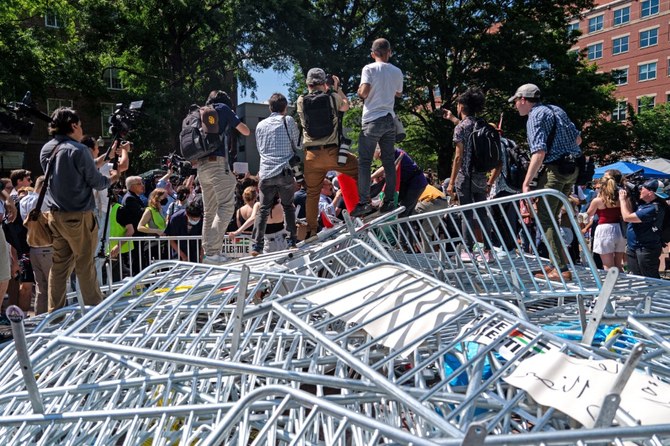
- Journalists said they have been barred from reporting on events
LONDON: Media watchdog Committee to Protect Journalists has called on authorities to allow journalists covering US college protests to do so “freely and safely.”
“Journalists — including student journalists who have been thrust into a national spotlight to cover stories in their communities — must be allowed to cover campus protests without fearing for their safety,” said Katherine Jacobsen, the CPJ’s US, Canada and Caribbean program coordinator.
“Any efforts by authorities to stop them doing their jobs have far-reaching repercussions on the public’s ability to be informed about current events.”
Tensions have escalated between pro-Palestinian demonstrators and law enforcement during recent protests at universities across the US.
On Tuesday night, New York police equipped with anti-riot gear forcibly entered Columbia University’s Hamilton Hall, a focal point of the protests, resulting in the arrest of approximately 300 pro-Palestinian students.
Meanwhile, student journalists at the University of California in Los Angeles reported being assaulted and exposed to gas during violent clashes. In Northern California, local journalists covering college demonstrations were detained and arrested by police.
The CPJ said at least 13 journalists had been arrested or detained since the start of the Israel-Hamas war on Oct. 7 and 11 have been assaulted while covering related protests in the US.
Those arrested include FOX 7 reporter Carlos Sanchez, who was shoved to the ground last month while covering a protest at the University of Texas in Austin. He is currently facing two misdemeanor charges.


